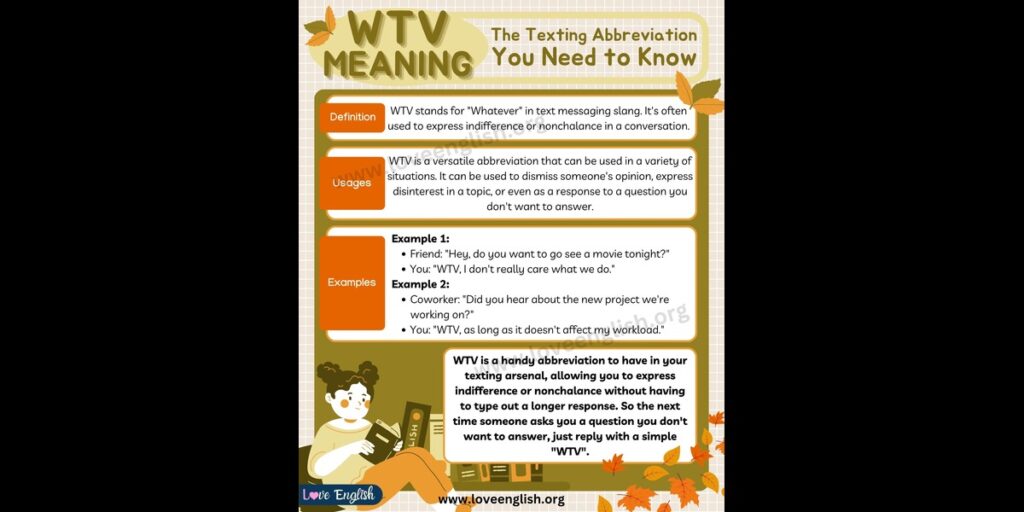
Introduction:
In the vast landscape of internet communication, where acronyms and abbreviations abound, “WTV Meaning” is a term that frequently pops up. But what does WTV mean, and how is it used? In this comprehensive guide, we’ll delve into the meaning of WTV, its origins, common usage scenarios, and its relevance in today’s digital conversations.
Understanding WTV Meaning:
WTV stands for “Whatever.” It’s an abbreviation commonly used in online messaging, social media platforms, and texting to express indifference, disregard, or a lack of concern about a particular topic or situation. When someone responds with “WTV Meaning” they’re essentially saying, “I don’t care,” “It doesn’t matter to me or Do whatever you want.”
Origins of WTV:
The exact origin of WTV Meaning is still being determined, as with many internet slang terms. However, it likely emerged from the need for brevity and speed in online communication. In the era of character-limited text messages and social media posts, users often use abbreviations and acronyms to convey their messages efficiently.

Common Usage Scenarios:
- Casual Conversations: WTV is frequently used in casual conversations among friends or peers, especially when making plans or discussing trivial matters. For example, if someone suggests going to a movie, and another person responds with “WTV,” it indicates that they’re indifferent to the choice and are okay with any option.
- Dismissal of Arguments: Participants might use WTV to dismiss an opposing viewpoint without engaging further in online debates or arguments. It can signify a refusal to continue the discussion or a lack of interest.
- Reacting to Minor Incidents: When someone shares a minor inconvenience or complaint, others might respond with WTV to downplay its significance or express that they’re unconcerned about it.
SEO FAQ’s:
Q1: What are some synonyms for WTV?
A1: Some synonyms for WTV include “Whatever,” “Doesn’t matter,” and “It’s all the same to me.”
Q2: Can WTV be considered rude?
A2: While WTV isn’t inherently rude, its usage in certain contexts or tones can be dismissive or indifferent, depending on the conversation’s dynamics.
Q3: Is WTV primarily used in English-speaking regions?
A3: Yes, WTV is predominantly used in English-speaking regions, but due to the global nature of the internet, it might also be encountered in conversations involving non-native English speakers.
Conclusion:
Understanding common abbreviations like WTV is essential for effective interaction in digital communication. Whether you encounter it in text messages, social media comments, or online forums, recognizing the meaning of WTV allows you to interpret messages accurately and participate meaningfully in conversations. So, the next time you come across WTV Meaning, you’ll know that it signifies a casual attitude of “whatever” or indifference towards the topic.







